
We’ve been tracking the rise of AI search and predicting its impact on the tech landscape throughout 2025. Earlier in March, I asked SEO experts Kevin Indig, Britney Muller, Marcus Tober, and Mordy Oberstein, one of the industry’s most pressing questions: “Are SEO tools ready for the AI search era?”
Fast-forward to today, our top five predictions from March have landed hard and reshaped B2B brand discovery:
From 10 blue links on search engines to a curated feed of answers in AI LLMs, AI search now dictates how B2B buyers discover, evaluate, and shortlist software. Here are some fresh stats for you:
As AI systems rely more on authentic, verifiable data, the platforms where that data lives, like G2, are becoming more powerful than ever. They supply the peer insights, structured data, and credibility that LLMs use to shape their synthesized answers.
Naturally, that raises an important question: Does G2 itself get featured in LLM-generated results?
Let’s find out from G2’s in-house experts, external third-party answer engine optimization (AEO) leaders, like Semrush, Profound, Radix, and industry expert Kevin Indig.
Over the past three months, G2’s visibility in AI-generated answers has climbed dramatically.
In August, our visibility score stood at 6.3%, ranking #7 globally among major software brands.
By October, that number had more than doubled to 14.9%, putting G2 at #1 overall — ahead of Microsoft, HubSpot, Salesforce, and Google.
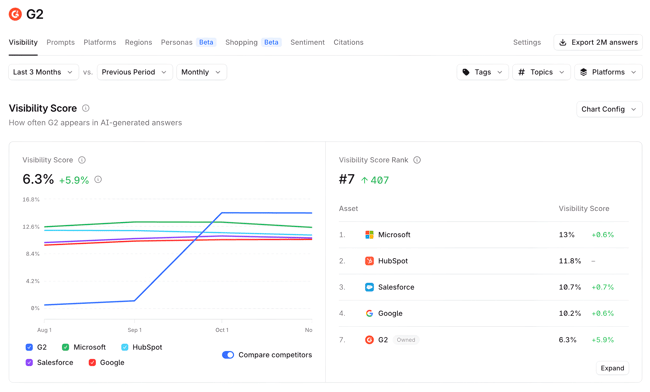
Source: G2 first-party data on AI visibility - August 2025
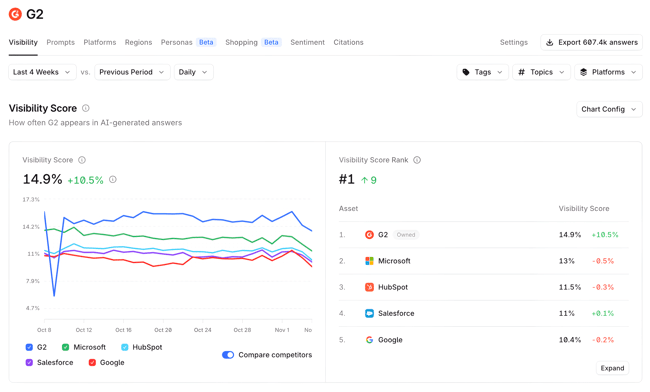
Source: G2 first-party data on AI visibility - October 2025
To understand what’s fueling that surge, I spoke with Mohammad Farooq, our Director of SEO Content at G2, who’s been tracking how our own signals surface across ChatGPT, Gemini, and Perplexity in real time.
“From the software categories we track, G2 has 100K+ citations that continue to grow every week,” says Farooq.
His insights underscore a larger truth: When content is structured around real buyer intent and validated by authentic reviews, it earns not just clicks but citations — the new currency of credibility in AI search.
“Most often, it’s our category pages or best-of listicles that get cited. Recently, we’ve seen user-generated content — actual reviews — quoted verbatim in AI answers.”
Farooq adds that G2’s momentum reflects deliberate optimization, not coincidence.
“G2’s authority in software, millions of verified reviews, and strong SEO foundation enable us to appear in AI-powered search results. We use structured data and test content readability to align with citation results.”
Together, these trends confirm what our own AEO tracking shows: G2’s signals — authority, trust, and review velocity — are increasingly shaping how AI models source, cite, and surface software information.
But don’t just take our word for it — here’s what third-party AEO leaders like Semrush, Profound, and challengers like Radix have to say about G2’s visibility across the AI search ecosystem.
According to the data Profound recently shared with us, G2 consistently dominates AI search citations among review platforms. Across tools like ChatGPT, Google AI Overviews, and Perplexity, between one-third and three-quarters of all review-site citations come from G2 — far surpassing competitors such as Capterra, TrustRadius, Gartner, and Product Hunt.
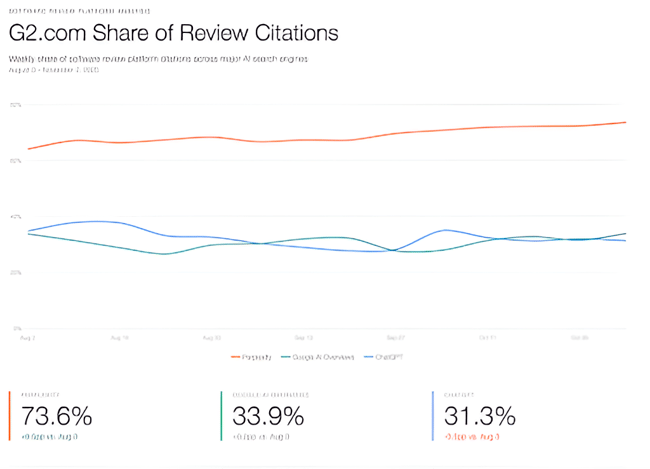
Source: G2 visibility data powered by Profound
Method of calculation used by Profound:
G2 citations ÷ Total review site citations (where review sites = G2 + Capterra + TrustRadius + Gartner + Trustpilot + SoftwareAdvice + GetApp + ProductHunt)
“G2 is the de facto source for product reviews. For ChatGPT and Google AI Overviews, about 33% of reviews cited come from G2 — and for Perplexity, that percentage is closer to 75%.”
Trevor Pyle
Head of Product Marketing, Profound
Trevor Pyle, Head of Product Marketing at Profound, explains that G2’s strong showing stems from the depth and structure of its comparative content. “G2 has a unique vantage point as a high-authority domain with rich, user-generated comparative data.
Structured product comparisons tend to support higher visibility within answer engines when users ask questions like “what’s the best project-management software for a small team under 10?”
Back in October, Semrush’s AI Visibility Index had ranked G2 as one of the top cited sources fueling ChatGPT & Google AI Mode (within the digital tech/software vertical).
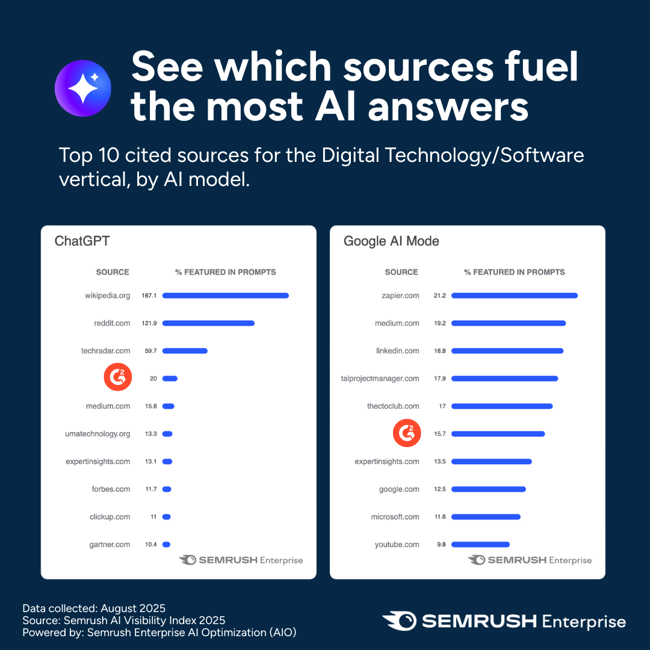
Jana Garanko, Head of Public Relations at Semrush, shared new data with us, and as of today, here’s what Semrush’s AI Visibility Toolkit says about G2’s visibility:
 Source: Semrush
Source: Semrush
Platform breakdown:
ChatGPT (7.4K mentions) | Google AI Overview (1.7K mentions) | Google AI Mode (6K mentions)
When benchmarked against key competitors, G2 edges out Capterra and clearly leads TrustRadius.
“Globally, G2 also leads the category in share of voice (22–23%) and sentiment (56–75%), ahead of Capterra’s ~20% share; meaning it’s not only more visible but also perceived more positively in AI-generated responses.”
Jana Garanko
Head of Public Relations at Semrush
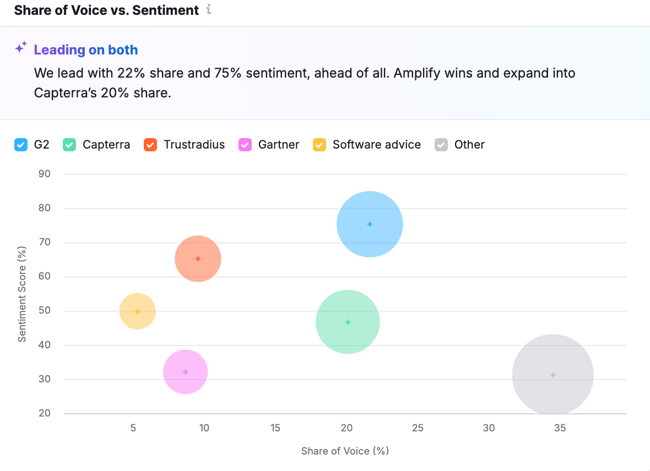
Source: Semrush
Example: In B2B software and review-related queries, ChatGPT and Google AI frequently reference G2 as among the top sources when summarizing or ranking tools.
On Nov 10 2025, Semrush’s latest cross-platform study ranked G2 among the top 20 most-cited domains overall placing it ahead of Instagram. In fact, G2 is the only B2B software review platform to appear on the list.
The Semrush team analyzed 230,000 prompts across ChatGPT, Google AI Mode, and Perplexity. And even in a dataset dominated by consumer and UGC-heavy domains like Reddit and LinkedIn, G2’s presence signals durable authority in AI-driven discovery.
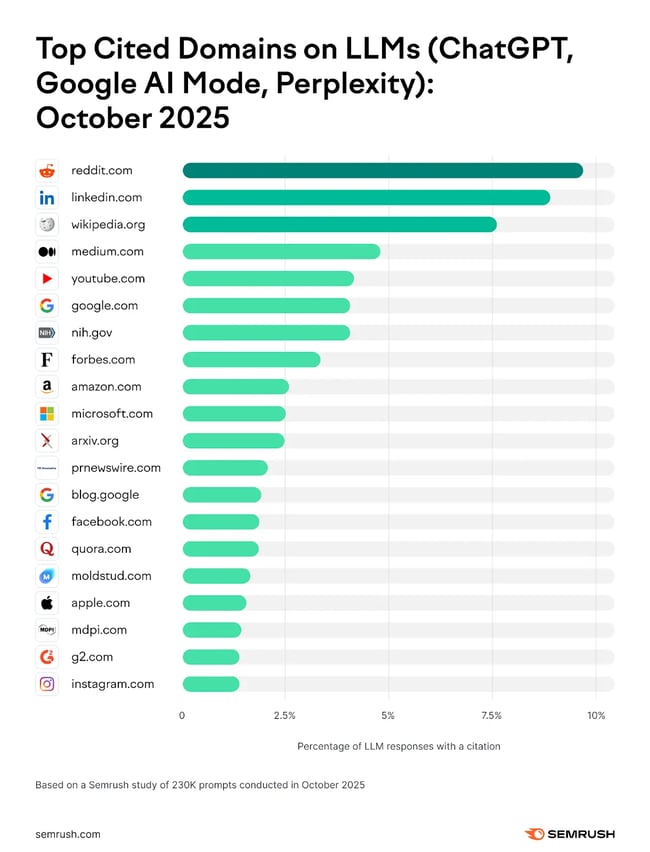
Source: The most-cited domains in AI: a 3-month study by Semrush
Spotlight AR × Profound's latest white paper showed that 20 million daily prompts on ChatGPT alone are tied to B2B buying decisions, and G2 appears in the top five vendors cited for HR tech, sales & marketing tech, and digital workplace queries.
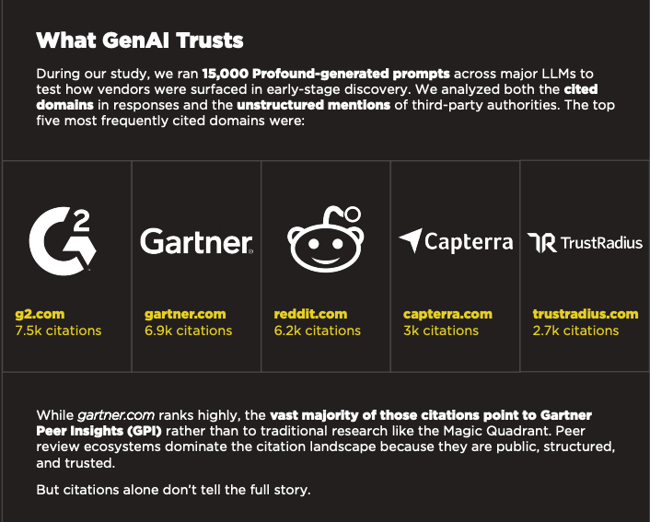
Radix analyzed 10K+ searches across ChatGPT, Perplexity, and Google AI Overviews and found G2 has the highest influence for software-related queries (22.4 % share of voice).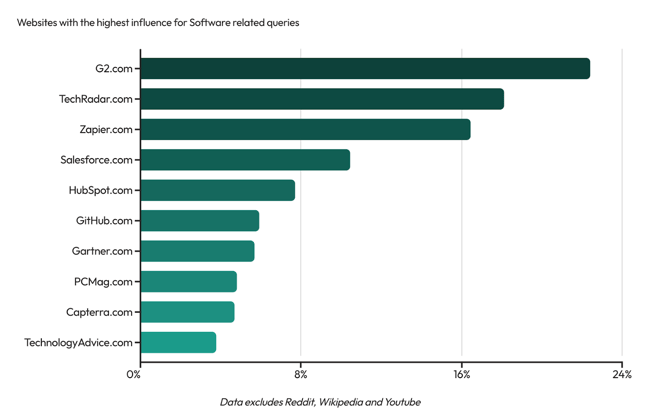
Key insight that jumps out from Radix’s analysis:
G2 pages are cited in every 1 out of 5 "product discovery" searches.
So, what type of queries cite G2 frequently?
PromptWatch tracked more than 100 million citations and clicks, and listed G2 as the most visible B2B software review platform.
 Source: PromptWatch
Source: PromptWatch
As AI adoption accelerates globally, regional visibility isn’t just a data point — it’s a strategy signal. Together, Semrush and Profound’s data show that AI visibility isn’t just a vanity metric — it’s a growth signal. For software sellers, knowing where and how your brand surfaces across regions can shape GTM strategy, localization priorities, and how you build trust with AI-driven buyers.
According to Semrush’s AI Visibility Toolkit, Jana Garanko, Head of PR at Semrush, highlighted that G2’s AI visibility peaks in the U.S. (47/100) but is comparatively lower across the U.K. (35/100) and Spain (30/100).
She noted that G2’s visibility in Europe, the Middle East, and Africa (EMEA) and Asia-Pacific (APAC) depends heavily on local-language data, brand presence, and third-party citations, all of which shape how AI models retrieve and reference regional content.
|
Region |
AI visibility |
Monthly audience |
Mentions |
Observation |
|
U.S. |
47/100 (Medium) |
103.7M |
15K |
Strongest performance; frequent citations in AI results. |
|
U.K. |
35/100 (Medium) |
1.3M |
1K |
Moderate presence, primarily in ChatGPT (382 mentions). |
|
Spain (ES) |
30/100 (Low) |
124K |
480 |
Significantly lower visibility vs. global; limited AI citations. |
This aligns with a broader macro trend:
Europe lags behind the U.S. in AI adoption, with varying progress across EU countries, despite the European Commission’s efforts to foster an environment for AI to thrive. — World Economic Forum, 2025.
In short, local-language data, cultural search behavior, and fewer regional LLM partnerships still limit visibility outside English-dominant markets. But the gap is narrowing fast as regional AI ecosystems mature.
Profound’s analysis of G2.com citations across the top 15 countries mirrors this pattern but also surfaces growth signals beyond North America.
Trevor shared that G2 is most cited in the U.S., where the software market is largest, but also shows surprising outperformance in Australia — an early indicator of expanding traction in EMEA and APAC as AI adoption broadens globally.
While the EMEA region still reflects lower citation volumes — consistent with slower AI integration — the data suggests that G2’s authority, structured comparative content, and user-generated reviews give it a strong foundation for visibility gains as these markets evolve.
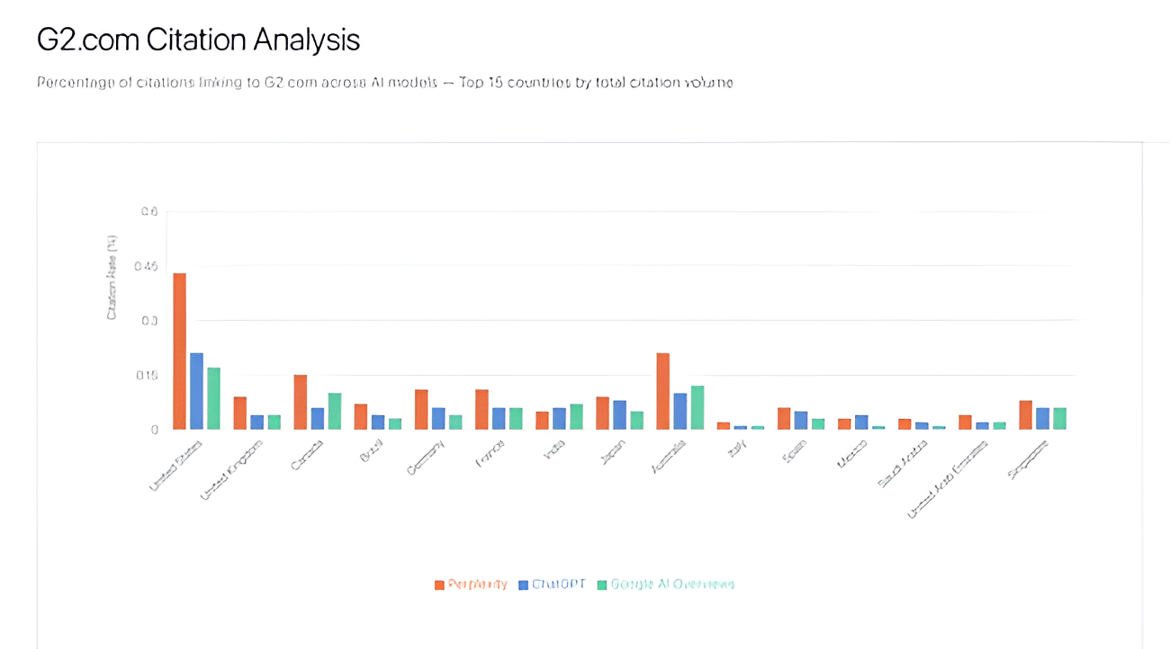
Source: G2 visibility data powered by Profound
To round out the picture, I turned to search expert Kevin Indig, an independent analyst who has been tracking these patterns at scale.
In his recent analysis of 30K AI citations across 500 software categories, Kevin Indig found that G2 had “the highest influence for software-related queries” with 22.4% share of voice (SOV) on ChatGPT, Perplexity, and Google AI Overviews.
Indig’s findings quantify something many marketers suspect:
“Categories with more G2 reviews get more AI citations and a higher SOV. A 10% increase in reviews correlates with a 2% increase in citations.”
Kevin Indig
Growth advisor
While reviews explain only ~2% of variance in visibility (compared to brand authority and content quality), they act as a machine-readable trust signal.
LLMs face a verification problem, and G2’s verified buyer reviews, standardized schemas, and review velocity solve it.
Kevin attributed G2’s 3 million verified reviews and the highest organic traffic in software categories that offer unmatched signal density.
Three factors consistently drive G2’s appearance in AI LLM search results:
Millions of verified reviews and robust category coverage give LLMs structured signals they can trust.
Profound’s Trevor adds that G2’s high-trust UGC gives LLMs the confidence to cite its data as a reliable source across categories — a key differentiator in an era where AI systems increasingly rely on structured, consensus-driven information.
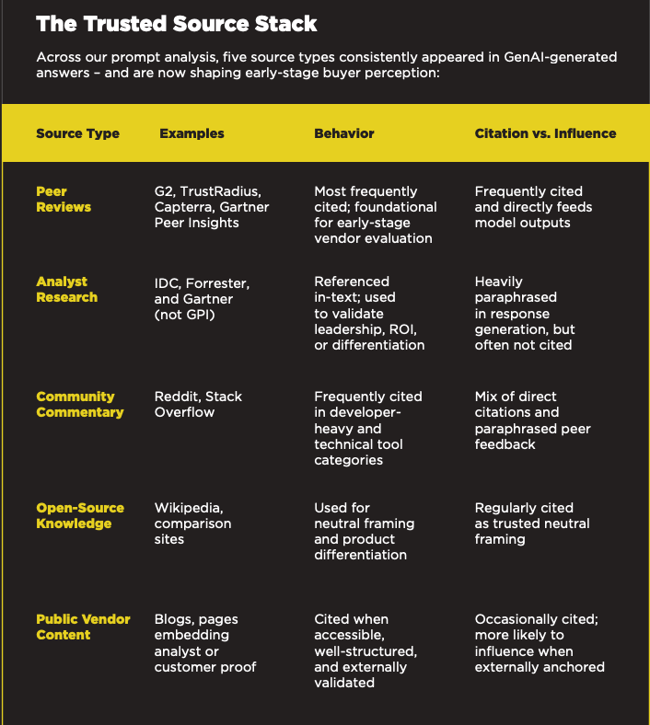
Source: Spotlight AR x Profound 2025 white paper
G2 pages use schema markup and readable content architecture, making citations frictionless for AI agents to parse.
According to Trevor, G2’s strong visibility also stems from “the depth and structure of its comparative content.” He explains:
“G2 has a unique vantage point as a high-authority domain with rich, user-generated comparative data. Structured product comparisons tend to support higher visibility within answer engines when users ask questions like ‘what’s the best project-management software for a small team under 10?’”
His observation reinforces that G2’s well-organized, intent-driven comparisons give AI models the context they need to surface G2 in qualified, purchase-stage responses.
Trevor credited that, “G2 also produces high-trust content, which is generally highly cited by answer engines.”
Farooq shared how G2’s SEO content is intentionally structured around real buyer intent and category language, helping AI bots contextualize information more accurately and align their responses with what software buyers are actively searching for.
Radix’s latest study identified G2 content types that drive citations in AI LLMs. Content that aligns with the journey of software buyers and helps them inform shortlists, as well as take the next step, adds to G2’s AI LLM citation appeal.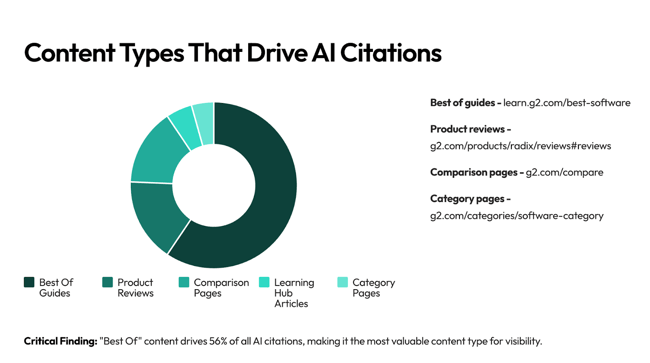
Source: Radix
Winning in the AI era is no longer about clicks, but citations. Here are some ways software sellers and GTM leaders can optimize for answer engines.
1. Audit your AI visibilityKeep your G2 profile complete and credible. Add a strong and differentiated description, transparent pricing, consistent review flow, and active discussions to help LLMs recognize your brand as authoritative and trustworthy.
3. Align content to intent and consensus
Write content that answers specific user needs and reflects consistent customer feedback. LLMs reward clarity and community agreement.
4. Measure beyond traffic
Visibility and SOV within AI answers are the new key performance indicators (KPI). As Kevin noted, traffic is no longer a North Star metric.
5. Invest in brand authority and action-oriented content
Reflecting on how G2 turns insight into action for AI-era visibility, Jenny Gardynski shared how she’s applying what we’re learning into practice.
“Credibility has always been the backbone of good content, but the rise of AI search now makes it non-negotiable. Third-party validation builds trust, which can be established through customer reviews, expert quotes, data, and independent report rankings.”
Jenny Gardynski
Sr. Director of Content & Comms, G2
Jenny advises every communicator, from PR to demand gen — to weave these proof points into their content, because the more credible your story is, the more your audience and AI will amplify it.
Investing in brand work through executive social media presence, partnerships, and industry thought leaders will benefit SEO and LLM visibility.
While global visibility starts with the right signals, sustaining it requires adapting to how different regions search, speak, and buy.
AI visibility isn’t one-size-fits-all. In emerging regions like EMEA and APAC, LLM citations still lean toward English-dominant sources — meaning sellers have a head start if they localize early.
As AI ecosystems in Europe and Asia mature, brands that adapt their visibility strategies to regional search behavior will surface first — and stay top of mind when AI answers.
Brands with strong narratives and trusted signals get the final word in AI responses.
Align what you want to be known for with what users actually say — consistent reviews, ratings, and third-party validation reinforce your positioning and help AI models recognize and cite your brand as a trusted source.
“Recently, we’ve noticed UGC content, such as reviews and discussions, being prominently quoted verbatim within answers. AI answers quote software product ratings and uses the review verbatim in their responses.” - Farooq
G2’s presence across AI LLMs proves that when a brand earns trust at scale, it’s not just ranked — it’s referenced. That’s the ultimate signal of authority in the age of answer engines.
As AI continues to reshape software discovery, brands that build trust, community consensus, and data-rich content will own the conversation — and the citation.
Want to measure your brand’s AI visibility? Explore Answer Engine Optimization (AEO) solutions on G2.
Edited by Supanna Das
Kamaljeet Kalsi is Sr. Editorial Content Specialist at G2. She brings 9 years of content creation, publishing, and marketing expertise to G2’s TechSignals and Industry Insights columns. She loves a good conversation around digital marketing, leadership, strategy, analytics, humanity, and animals. As an avid tea drinker, she believes ‘Chai-tea-latte’ is not an actual beverage and advocates for the same. When she is not busy creating content, you will find her contemplating life and listening to John Mayer.
AI visibility platforms, like Radix or Promptwatch, have found G2 to be the most cited...
.png) by Kevin Indig
by Kevin Indig
A year ago, SEO success meant asking: "Do you rank for your target keywords?"
 by Tanushree Verma
by Tanushree Verma
The world of AI search is moving fast, and this week’s news is all about Reddit and OpenAI. Or...
.png) by Kevin Indig
by Kevin Indig
AI visibility platforms, like Radix or Promptwatch, have found G2 to be the most cited...
.png) by Kevin Indig
by Kevin Indig
A year ago, SEO success meant asking: "Do you rank for your target keywords?"
 by Tanushree Verma
by Tanushree Verma


